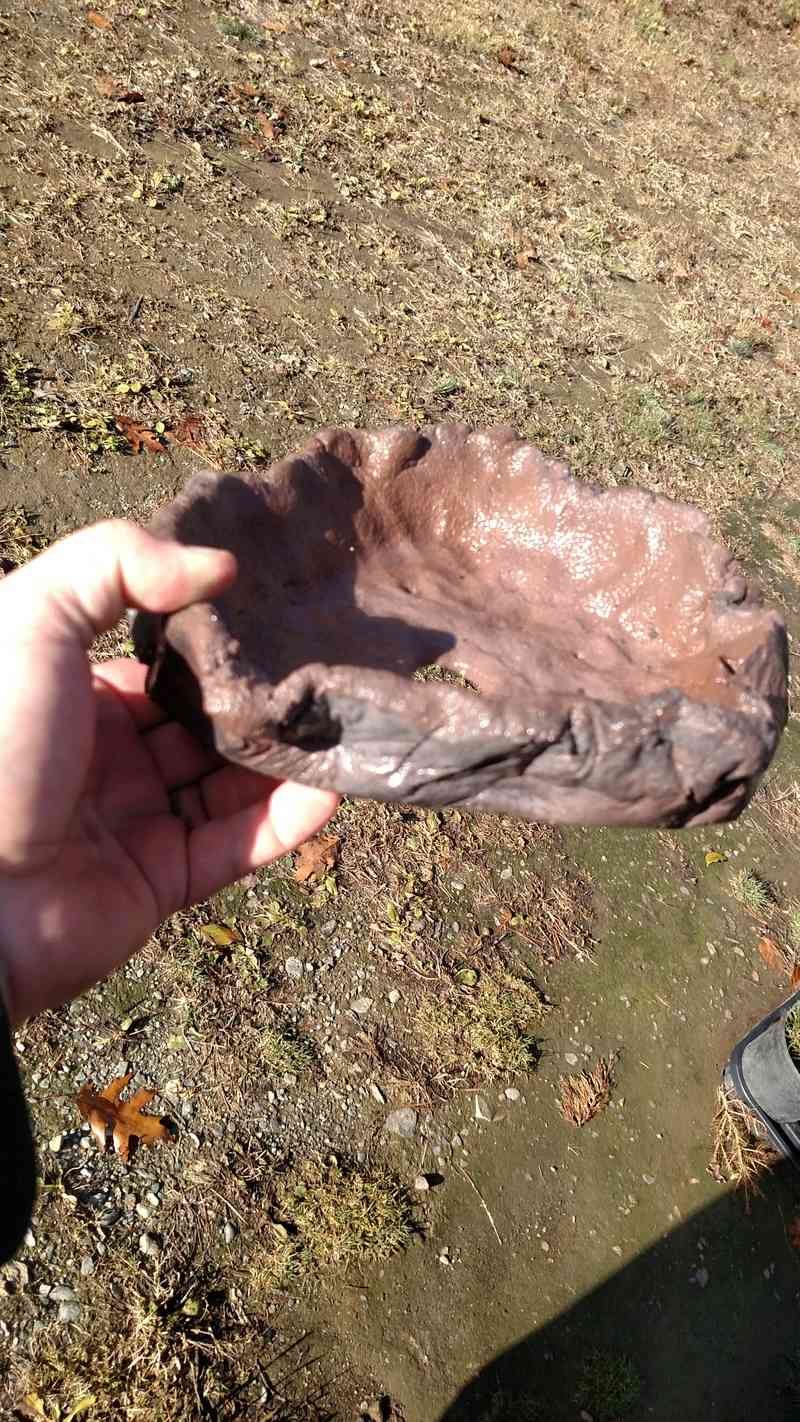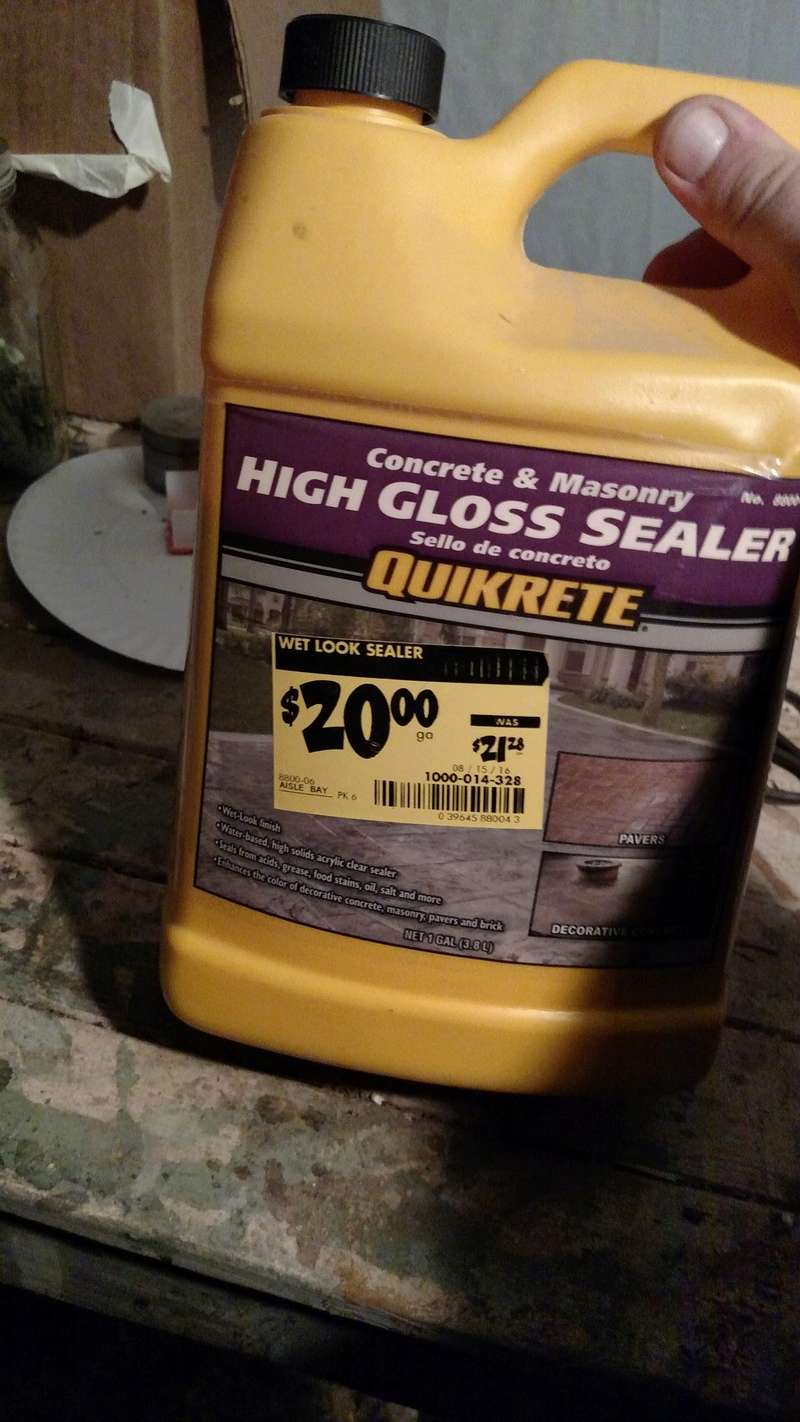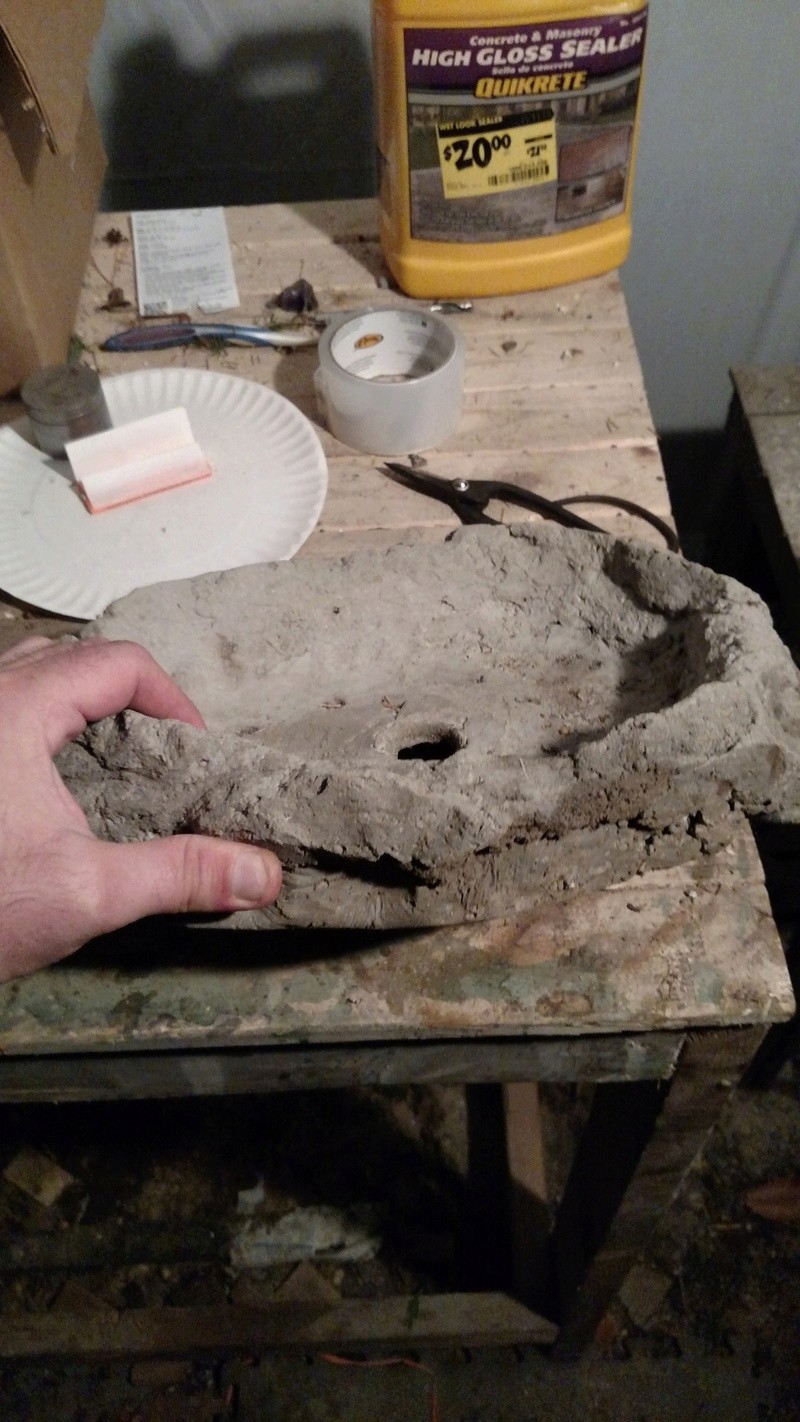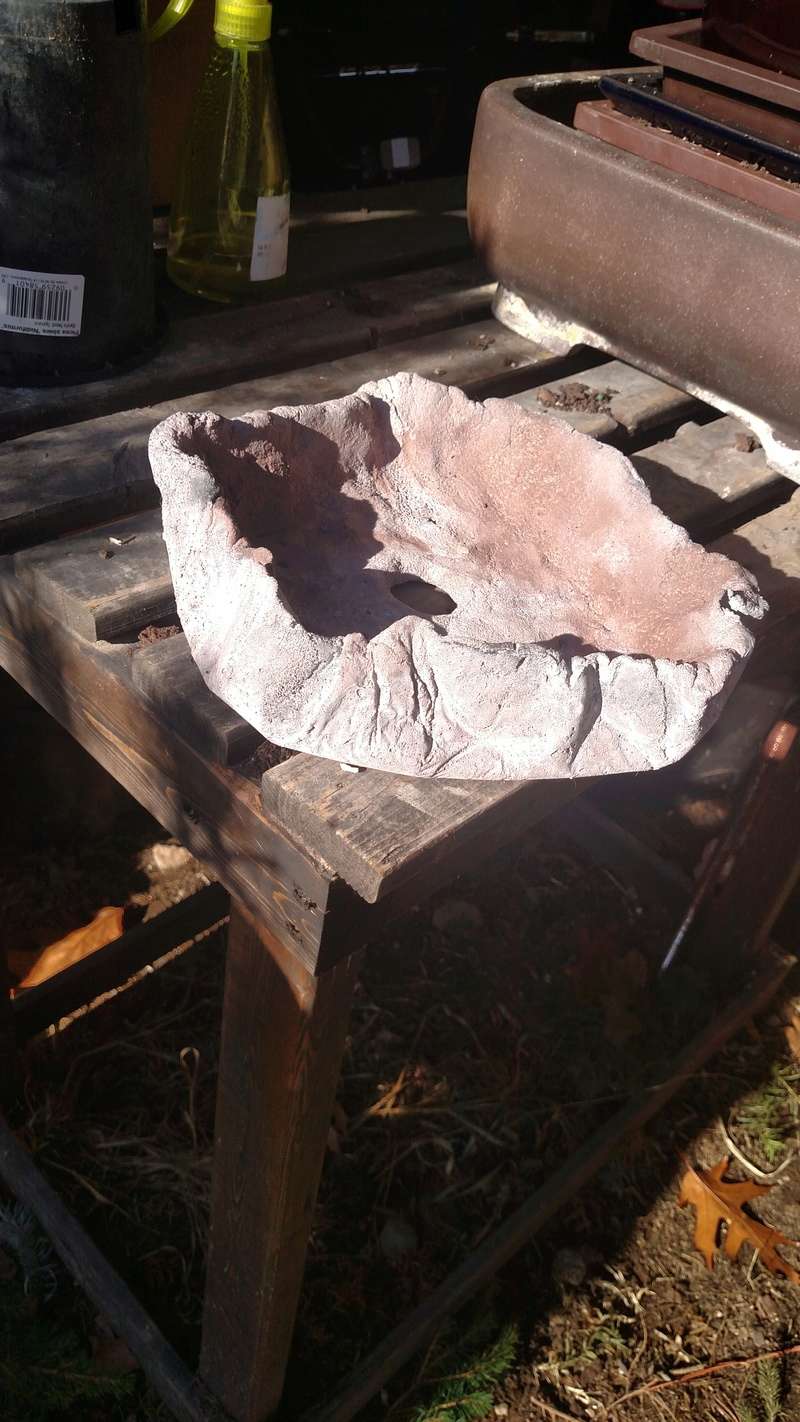ShapeCrete
+4
Khaimraj Seepersad
BrendanR
Kevin S - Wisco Bonsai
steveb
8 posters
Page 1 of 1
 ShapeCrete
ShapeCrete
Has anyone ever used ShapeCrete to make slabs for forest plantings? How about for bonsai pots?
https://i.servimg.com/u/f37/18/56/76/95/image10.jpg

https://i.servimg.com/u/f37/18/56/76/95/image10.jpg


steveb- Member
 Re: ShapeCrete
Re: ShapeCrete
well that took all of 2 minutes... 23 bucks at home depot and free delivery to my nearest store. done.
thanks for the tip !
thanks for the tip !

Kevin S - Wisco Bonsai- Member
 Re: ShapeCrete
Re: ShapeCrete
You're welcome.
Just bought some as well. It recommends a sealer if using it for ponds. Might need to consider this for bonsai.
I'll have to wait until 11/25 to get mine though.
Later
Just bought some as well. It recommends a sealer if using it for ponds. Might need to consider this for bonsai.
I'll have to wait until 11/25 to get mine though.
Later

steveb- Member
 Re: ShapeCrete
Re: ShapeCrete
Requests by folk on-line about the contents led to this,
uses limestone and is caustic.
Additionally one can use an acrylic binder glue, to get a similar effect.
The Shapecrete site also shows the creation of a Bonsai pot.
Good Luck
Khaimraj
uses limestone and is caustic.
Additionally one can use an acrylic binder glue, to get a similar effect.
The Shapecrete site also shows the creation of a Bonsai pot.
Good Luck
Khaimraj

Khaimraj Seepersad- Member
 similar produkt from denmark
similar produkt from denmark
www.makemake.se/category/makemake-dekorationsbetong-8/
comes in 8 or 18 kilo bags..
i used normal concrete before,but this produkt might be
more easy to shape...without a mould...
comes in 8 or 18 kilo bags..
i used normal concrete before,but this produkt might be
more easy to shape...without a mould...

stoneage- Member
 Re: ShapeCrete
Re: ShapeCrete
Oh and I diddnt find it much diffrent than using regular concrete. Except the fibers that comes in it for added strength. Wasn't really "clay like" as they advertise.
brian soldano- Member
 Re: ShapeCrete
Re: ShapeCrete
Feels like it should flattened using a cloth and then draped over a simple shape, soft rectangle or bowl.
Then removing the cloth, using a bamboo skewer or other tool and put in the design and feet.
The clay-like aspect maybe due to the mass holding together.
Use would be more like how the Chinese work clay, the mould is on the inside.
Thanks for showing.
Easy material to work with.
Laters.
Khaimraj
* Good to note it has fibres for strength.
Then removing the cloth, using a bamboo skewer or other tool and put in the design and feet.
The clay-like aspect maybe due to the mass holding together.
Use would be more like how the Chinese work clay, the mould is on the inside.
Thanks for showing.
Easy material to work with.
Laters.
Khaimraj
* Good to note it has fibres for strength.

Khaimraj Seepersad- Member
 Re: ShapeCrete
Re: ShapeCrete
Great pot Kevin! Just got mine tonight. I'll give it a shot this weekend. Bought some model paint as well and my experiment with some colors.

steveb- Member
 Re: ShapeCrete
Re: ShapeCrete
yes kev it is brown. Doesn't really show it when it's dry but when its wet watch out. I'll see if I can snag some pics tomorrow. The color will prob pop more when I seal itkevin stoeveken wrote:cool enough for me...
brian - is yours tinted ?
brian soldano- Member
 Re: ShapeCrete
Re: ShapeCrete
here's the brown one wet. And the sealer product. I'll prob do some experiments with doing some inside only the stop the Crete from leeching moisture from the soil. And hoping I can get.moss to grow.on the outside of the pot.kevin stoeveken wrote:and what are ya gonna seal with ?
inside and out ?



The last one is a larger free form built on 1/4 inch hardware cloth. I used rocks draped in plastic to keep the sides in place while it cured. No color added on that one
brian soldano- Member
 Re: ShapeCrete
Re: ShapeCrete
right on...
i personally will be leaning toward a matte sealer i think,
but show us your when it is sealed...
this is gonna be a fun thing to play with
i personally will be leaning toward a matte sealer i think,
but show us your when it is sealed...
this is gonna be a fun thing to play with

Kevin S - Wisco Bonsai- Member
 Re: ShapeCrete
Re: ShapeCrete
What is the purpose of sealer if you want good drainage, and the pot itself can become a moisture retainer sometimes? The concrete will continue to harden in the presence of water for months, from what I understand. The only advantage I can see is to protect from freeze damage.
Dave Leppo- Member
 Re: ShapeCrete
Re: ShapeCrete
yes the sealer in my case would mostly contribute to the cold in the Northeast they are fiberglass mesh and wire reinforced but stuff gets wet and freezes and thaws and refreezes all winter here. And yes the cement would constantly leech water from the soil which would help the soil not retain as much water but that's not any concern. I could water 3 times a day and still not over water anything, the soil doesn't need help draining or expelling extra water that's forsureDave Leppo wrote:What is the purpose of sealer if you want good drainage, and the pot itself can become a moisture retainer sometimes? The concrete will continue to harden in the presence of water for months, from what I understand. The only advantage I can see is to protect from freeze damage.
brian soldano- Member
 Re: ShapeCrete
Re: ShapeCrete
We soak concrete pots for about a month, in large quantities of water.
For an exterior glaze we used coloured wax, but leave the base wax free.
The pots will normally soak away and evaporate on the exterior.
Laters.
Khaimraj
For an exterior glaze we used coloured wax, but leave the base wax free.
The pots will normally soak away and evaporate on the exterior.
Laters.
Khaimraj

Khaimraj Seepersad- Member
 Re: ShapeCrete
Re: ShapeCrete
khai... our friend leo was employed at one time in the concrete industry and he too suggests that concrete pots be soaked in water in order to leach out the undesirable whatchamacallit...

Kevin S - Wisco Bonsai- Member
 Re: ShapeCrete
Re: ShapeCrete
Damn, dog ate my homework. Wrote one of my 1200 word essays on concrete, and it disappeared into the electronic vapors. Oh well.
Haven't used Shape Crete yet, but I am somewhat familiar with this type of concrete chemistry.
All concrete contains a fair amount of calcium oxide which becomes calcium hydroxide when water is added to the cement powder. Calcium hydroxide is Lye, highly alkaline, and if you ''play'' with the concrete with your bare hands, it will turn the fat in your skin to soap. Not very painful while it is happening, but very painful a few hours later when your skin begins to slough off. (in severe cases) That is a unique property of alkali burns, the nerves don't usually signal it is happening. Washing your hands after touching wet concrete, or wet cement paste, you will notice they feel unusually soapy, that is the fat of your skin that has already been turned to soap. Always wear gloves while working with wet concrete.
I know for fish ponds, leaching the concrete is critical. For planters, it doesn't have to be as totally free of calcium hydroxide, and sealers may seal in the caustic. BUT, if you want to put azalea, hornbeams, or other species that are sensitive to alkaline soils into the concrete pot, it is a good idea to leach the pot first.
Myself, after the pot has set for 48 hours to a week, I would submerge it in a bucket of water. Change the water once a week. I would do this for a full month to be certain that the majority of calcium hydroxide has been leeched out. Then set the pot on the shelf to dry for a month, then apply what ever sealer you are going to use.
If you are not going to use a sealer, you could use the pot wet right from the last bucket it was soaking in.
If you are watering your bonsai daily, and really flushing them with water, it may not be all that critical to soak them, but I like azaleas, and other acid soil loving plants, so I would probably soak all of mine for at least 2 to 4 weeks with 2 to 4 changes of water. If you are raising fish in your concrete construction, 8 weeks, with 8 water changes would be best.
Hope this helps.
Haven't used Shape Crete yet, but I am somewhat familiar with this type of concrete chemistry.
All concrete contains a fair amount of calcium oxide which becomes calcium hydroxide when water is added to the cement powder. Calcium hydroxide is Lye, highly alkaline, and if you ''play'' with the concrete with your bare hands, it will turn the fat in your skin to soap. Not very painful while it is happening, but very painful a few hours later when your skin begins to slough off. (in severe cases) That is a unique property of alkali burns, the nerves don't usually signal it is happening. Washing your hands after touching wet concrete, or wet cement paste, you will notice they feel unusually soapy, that is the fat of your skin that has already been turned to soap. Always wear gloves while working with wet concrete.
I know for fish ponds, leaching the concrete is critical. For planters, it doesn't have to be as totally free of calcium hydroxide, and sealers may seal in the caustic. BUT, if you want to put azalea, hornbeams, or other species that are sensitive to alkaline soils into the concrete pot, it is a good idea to leach the pot first.
Myself, after the pot has set for 48 hours to a week, I would submerge it in a bucket of water. Change the water once a week. I would do this for a full month to be certain that the majority of calcium hydroxide has been leeched out. Then set the pot on the shelf to dry for a month, then apply what ever sealer you are going to use.
If you are not going to use a sealer, you could use the pot wet right from the last bucket it was soaking in.
If you are watering your bonsai daily, and really flushing them with water, it may not be all that critical to soak them, but I like azaleas, and other acid soil loving plants, so I would probably soak all of mine for at least 2 to 4 weeks with 2 to 4 changes of water. If you are raising fish in your concrete construction, 8 weeks, with 8 water changes would be best.
Hope this helps.

Leo Schordje- Member
 Re: ShapeCrete
Re: ShapeCrete
But the way, the cement in concrete will set even under water. The setting up of concrete is a chemical reaction, a hydration reaction, and will continue even under water. However, under water the cement paste has a tendency to wash or float away, so that is why you don't put the pot in the bucket until after the concrete has had enough time to hold its shape. Normally the hydration reaction is about 50% complete at 48 hours. Normally concrete will take about 28 days to come up to 90% of its final compressive strength. It will continue to slowly increase compressive strength for a year or more. Hape crete may have the additives necessary to speed this process, this is just a factoid for your amusement, and one of the reasons a new bridge deck on that highway may look finished, but remains closed to traffic for a few weeks.
If you want to avoid the surface of your pot from flaking, cover your concrete pot with a damp cloth to keep the outer surfaces moist for at least 48 hours. This is more important in low humidity desert areas, where it is possible to dry out the surface before the hydration reaction is complete enough to hold. The smaller the pot, the more covering it with a damp cloth will help it set.
If you like a rough, flaky surface, skip the cloth. But if you want a burnished surface, the damp cloth is helpful.
If you want to avoid the surface of your pot from flaking, cover your concrete pot with a damp cloth to keep the outer surfaces moist for at least 48 hours. This is more important in low humidity desert areas, where it is possible to dry out the surface before the hydration reaction is complete enough to hold. The smaller the pot, the more covering it with a damp cloth will help it set.
If you like a rough, flaky surface, skip the cloth. But if you want a burnished surface, the damp cloth is helpful.

Leo Schordje- Member
Page 1 of 1
Permissions in this forum:
You cannot reply to topics in this forum







